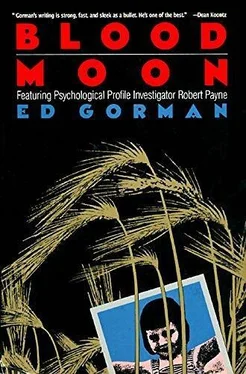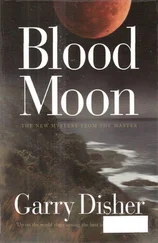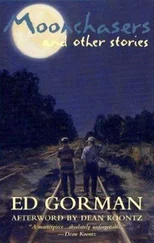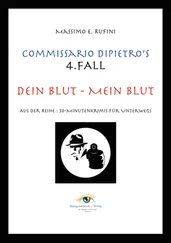I kept checking my rearview for any sign of Nora and Vic. None.
After parking my car, I decided to treat myself to a 7-Up and a Hershey bar (with almonds, of course) so I went to the motel office and got some change.
“Big night,” the elderly clerk said as he fanned four quarters out on the counter.
“Oh?”
“Yeah. One person killed, another one bad wounded out to the old Brindle place.”
Jane hadn’t been exaggerating. Serious stuff indeed.
“Fred over to the DX?”
“Yeah?” I said, pretending I knew just who Fred was.
“Just was out there. Said they sure ruined a nice new Caddy. Blood all over the interior. Said that’s not the kind of stuff that washes off, either.”
A few moments ago I’d been checking my rearview for any sign of Nora and Vic. Maybe they wouldn’t ever be following me again.
“Can you tell me how to get to the Brindle place?”
“Sure. If you want. But Fred said it’s pretty damned grisly.”
There must have been thirty cars parked lining both sides of the winding gravel road that ran past the Brindle farm, which was basically an aged and deserted farmhouse with the windows boarded up, and a faded barn that some local kids had spray-painted dirty words all over. Down close to a creek was another barn that, while smaller, was also a lot fancier, with a gabled roof and a cross-gabled cupola. The sprawling land to the east looked as if it hadn’t been seeded in some time. Overhead, a state police chopper hovered, its search lights crisscrossing the rolling countryside.
I had to walk a quarter mile till I reached the driveway and the ambulance and the two squad cars and the blue Caddy.
I saw Jane. She was talking to a short man in a dark suit. He carried a small leather bag and was presumably the medical examiner. Jane looked harried.
Up close, the house had an eerie quality I couldn’t explain to anybody who hadn’t been around crime scenes much. While most detectives won’t come right out and tell you that some houses — just like some wooded areas and indeed some human beings — aren’t exactly cursed or haunted, there is a disturbing, baleful quality to them that makes you want to get away as soon as possible. While the activities of satanic cults are greatly exaggerated by the press, I’d once seen a house used for rituals where a four-month-old child had been sacrificed to the psychotic whims of the cultists. At least as far as I was concerned, it would never be a fit place for human habitation ever again. The baby’s screams would never quite be stilled.
“Sorry, keep back.”
He was maybe twenty-five with a beer gut and a macho mustache. This was probably his first murder as an auxiliary deputy and he meant to make the most of it. He had a gun, a badge and a khaki shirt with heavy sweat rings under the armpits. He even had a little cigarillo clamped between his teeth.
I was about to tell him something obscene when Jane looked over and saw me, excused herself from the doctor, and dropped by to cool the official ardor of her auxiliary cowboy.
“It’s all right, Fred, he’s a friend.”
“He shoulda said so, then,” Fred said, swaggering elsewhere to shine his badge in somebody else’s eyes.
“Fred’s the mayor’s son,” Jane said.
“Now, there’s a surprise.”
She looked back at the blue Caddy in the driveway. She had a yellow pad in her left hand and a pencil in her right. She sketched in some more of the crime scene, which she had started earlier by measuring various objects in relation to the bodies. This sketch would later be refined into a finished product complete with a scale on the order of ¼" = 1'. This would ultimately be used by the district attorney or the county attorney in making his case.
Just as she was finishing, the left door of the blue Caddy was opened by a startlingly young-looking woman in white coveralls and the process of bringing the bodies out was begun.
“One dead?” I asked as I watched.
Jane nodded. “Yes. A woman. The man’s already been taken to the hospital. He’s alive, but not for much longer, I’m afraid.”
I saw her then, in that moment before the final sheet was pulled over her the final time. Nora Conners. She had been wearing a white sweater and jeans. Her blonde hair was streaked and damp with blood; her white sweater was bathed in the stuff. I couldn’t see a lot from this distance but it appeared that she had been both shot and stabbed.
The attendants eased the corpse into the rear of the big boxy ambulance, closed the doors quietly and then moved with no particular hurry to the vehicle’s cab. There was no reason to hurry.
“You look funny.”
I was aware of Jane’s eyes on me.
“I always look funny.”
“No, you don’t. You usually look handsome, and you know it. But now you look funny. Ever since you saw the corpse.” She hesitated, studied me a little more. “By the way, I don’t believe your ‘journalist’ story.”
“You don’t?”
“No. I called your publishing office.”
“Then they told you that I do work for them.”
“I have a brother in the FBI.”
“Ah. I’ll bet you’re proud.”
She frowned. “Wise ass, aren’t you?”
“I’m just trying to forget what that corpse looked like.” And that was certainly the truth. When they get worked over the way Nora was, all I can think of are slaughterhouses — what we humans do to the animals we raise to eat, how they look just as we’re knocking them out with long clubs, and then chop off their heads, and then hang them from their feet and open up their bellies with long shining knives. I always wonder, when I’m on the highway and I see a truck of cows or pigs headed to the slaughterhouse, I always wonder if they know. Perhaps it’s our fantasy that they don’t know because we can’t face the truth. Maybe they do know, and the startled bleating we hear on the highway is the sound of one species crying out to another for help. I wonder if Nora knew, as the killer approached her car tonight, knew what was coming, what the killer was bringing, and cried out for help.
“Did you know her?”
“Who?”
“The dead woman.”
“No.”
“Would you take it personally if I called you a liar?”
“You’re the law around here. You can call me anything you want.”
“I’ve got good instincts.”
“Meaning?”
“Meaning somehow you know something about this.”
She was about to say more when a fat bald detective in a suit came over shaking a small black camera as if he wanted to smash it against the wall. “I told the city council, I told the mayor in particular, that we need a new 35 millimeter for crime scenes and as usual he gave me the standard excuses about the budget. I’m supposed to be taking pictures and the goddamned shutter won’t work. You bring yours along, Chief?”
“In my glove compartment.”
He looked at me and shook the camera again and said, “You ever just want to smash something to bits?”
“All the time,” I said.
He went over to her car.
“He’s not taking his tranquilizers,” she said.
“How come?”
“Claims that yes, they do calm him down but no, he can’t urinate properly when he takes them. So he doesn’t take them and gets pretty squirrelly.”
She looked back at the crime scene.
Here we were in the rolling prairie night, all these red and white emergency lights whirling around in the gloom, all these farmers and small-town folks standing in the gravel road partly thrilled and partly horrified by what had happened here tonight. I wondered what the birds made of all this, or the wolves running in the hills, or the owl in the old barn down the hill. Just one more dumb-ass human doing one more dumb-ass human thing, the animals were probably thinking. These humans didn’t even kill each other for the only reason that justified killing — survival — these humans killed each other for money and sex and jealousy. They didn’t make any sense, these humans, and owl and wolf and bird would be glad when the lights and the noise and the sweaty intense fascination were all taken away and the land given back to the moon and the clouds and the fast-running creeks, that sense of order and peace and oneness I had only when I was up in my biplane.
Читать дальше









